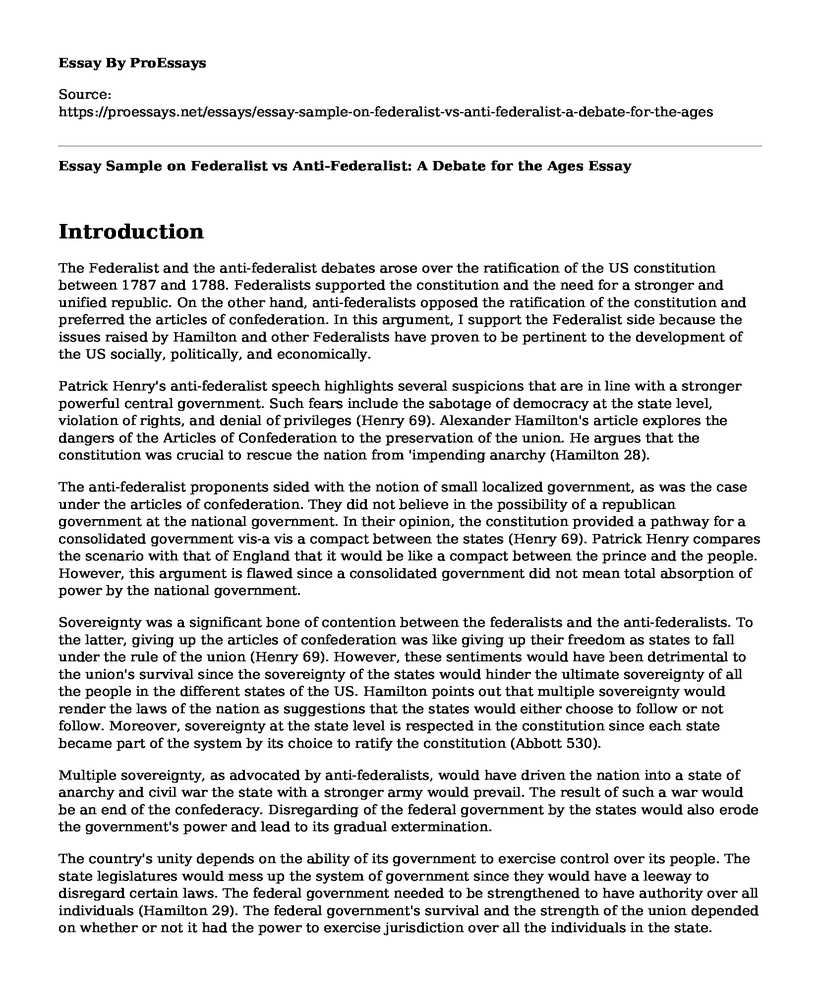Introduction
The Federalist and the anti-federalist debates arose over the ratification of the US constitution between 1787 and 1788. Federalists supported the constitution and the need for a stronger and unified republic. On the other hand, anti-federalists opposed the ratification of the constitution and preferred the articles of confederation. In this argument, I support the Federalist side because the issues raised by Hamilton and other Federalists have proven to be pertinent to the development of the US socially, politically, and economically.
Patrick Henry's anti-federalist speech highlights several suspicions that are in line with a stronger powerful central government. Such fears include the sabotage of democracy at the state level, violation of rights, and denial of privileges (Henry 69). Alexander Hamilton's article explores the dangers of the Articles of Confederation to the preservation of the union. He argues that the constitution was crucial to rescue the nation from 'impending anarchy (Hamilton 28).
The anti-federalist proponents sided with the notion of small localized government, as was the case under the articles of confederation. They did not believe in the possibility of a republican government at the national government. In their opinion, the constitution provided a pathway for a consolidated government vis-a vis a compact between the states (Henry 69). Patrick Henry compares the scenario with that of England that it would be like a compact between the prince and the people. However, this argument is flawed since a consolidated government did not mean total absorption of power by the national government.
Sovereignty was a significant bone of contention between the federalists and the anti-federalists. To the latter, giving up the articles of confederation was like giving up their freedom as states to fall under the rule of the union (Henry 69). However, these sentiments would have been detrimental to the union's survival since the sovereignty of the states would hinder the ultimate sovereignty of all the people in the different states of the US. Hamilton points out that multiple sovereignty would render the laws of the nation as suggestions that the states would either choose to follow or not follow. Moreover, sovereignty at the state level is respected in the constitution since each state became part of the system by its choice to ratify the constitution (Abbott 530).
Multiple sovereignty, as advocated by anti-federalists, would have driven the nation into a state of anarchy and civil war the state with a stronger army would prevail. The result of such a war would be an end of the confederacy. Disregarding of the federal government by the states would also erode the government's power and lead to its gradual extermination.
The country's unity depends on the ability of its government to exercise control over its people. The state legislatures would mess up the system of government since they would have a leeway to disregard certain laws. The federal government needed to be strengthened to have authority over all individuals (Hamilton 29). The federal government's survival and the strength of the union depended on whether or not it had the power to exercise jurisdiction over all the individuals in the state.
Rights and freedoms formed the center stage of the ratification debate. For anti-federalists, It was giving up their rights, the rights of conscience, trial by jury, and freedom of the press (Henry 68). Indeed, It was alarming that the proposed constitution did not at first contain a section of the bill rights. In my opinion, this was a valid point dispute for the anti-federalists because all rights and freedoms needed to be protected both at the state and federal levels.
Conclusion
In conclusion, the only way to preserve the union was through strengthening of the central government as brought out by Hamilton. Patrick Henry's speech is guided by fear and suspicion of a powerful central government and sabotage of democracy among the states. However, his argument overlooked the fact that the proposed constitution contained significant elements of checks and balances.
Works Cited
Abbott, Philip. "'What's New in the Federalist Papers?"." Political Research Quarterly. Vol. 49, no. 3, 1996. 525-545
"Federalist 15." Hamilton, Alexander. The Federalist Papers. Ed. Lawrence Goldman. New York: Oxford University Press, 2008.
Henry, Patrick. "Patrick Henry Anti- Federalist Speech." The Anti- Federalists Papers and the Constitutional Debates. Ed. Ralph Ketcham. New York: Penguin Publishing Group, 2003. 68-70.
Cite this page
Essay Sample on Federalist vs Anti-Federalist: A Debate for the Ages. (2023, Apr 08). Retrieved from https://proessays.net/essays/essay-sample-on-federalist-vs-anti-federalist-a-debate-for-the-ages
If you are the original author of this essay and no longer wish to have it published on the ProEssays website, please click below to request its removal:
- The News Story About Donald Trump
- The Rise and Decline of Arab Nationalism
- Our Democracy Has Failed and No Longer Represents the People - Paper Example
- Politics of Aids Policy Growth in South Africa Essay
- Essay on America's Reputation for Democracy: Slavery and Expansion in the 1850s
- Essay Example on Nationalism: A Political and Emotional Expression of Identity.
- John Stuart Mill & Karl Marx: A Debate on Post-Ricardian Thought







